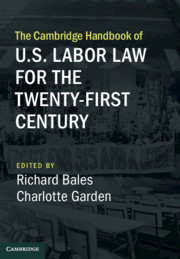The Cambridge Handbook of U.S. Labor Law for the Twenty-First Century Cambridge Law Handbooks Series
Coordonnateurs : Bales Richard, Garden Charlotte

Charlotte Garden is Associate Professor at the School of Law, Seattle University, where she teaches labor, employment, and constitutional law. She has published numerous law review articles focusing on the legal status and rights of unions and workers, and she co-authors two leading labor and employment law casebooks.
Date de parution : 09-2020
Ouvrage de 433 p.
18x25.5 cm
Disponible chez l'éditeur (délai d'approvisionnement : 14 jours).
Prix indicatif 38,06 €
Ajouter au panierDate de parution : 12-2019
Ouvrage de 426 p.
18.4x26 cm
Disponible chez l'éditeur (délai d'approvisionnement : 14 jours).
Prix indicatif 264,95 €
Ajouter au panier

